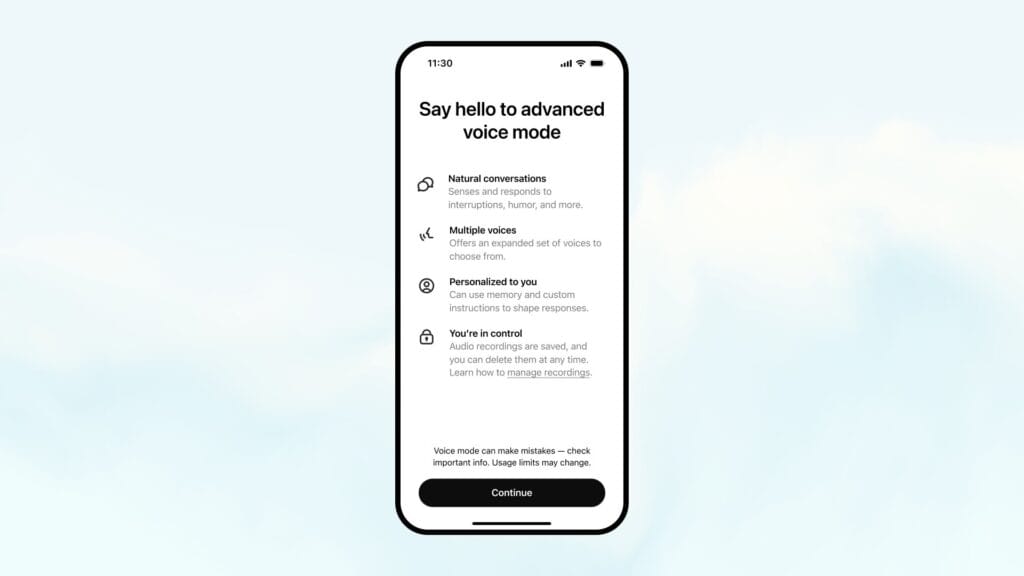When OpenAI unveiled ChatGPT’s Advanced Voice mode, I was excited to try it. However, it turned out we all had to wait. Back in May, OpenAI simply wanted to beat Google to the punch, which was about to show off similar multimodal powers for Gemini, including a more conversational voice mode.
Advanced Voice mode brought more natural conversations to ChatGPT, including support for interrupting the AI without interrupting its train of thought. The new mode also gave the AI a more human-like personality, as the voices mimic human voices better than ever. However, OpenAI wasn’t ready for a full rollout.
Instead, OpenAI initially made Avanced Voice mode available to a select number of users. Then, OpenAI released Advanced Voice mode to ChatGPT Plus and Team users earlier this week. As a paying ChatGPT Plus user, I was excited to try out the new voice functionality. But I didn’t get my hopes up. I’m using ChatGPT in the European Union, so I’ll have to wait longer for the newest features to drop.
It turns out I was right. OpenAI confirmed right away that ChatGPT won’t get Advanced Voice mode in the EU. And it looks like we know why: The EU’s AI act.
Tech. Entertainment. Science. Your inbox.
Sign up for the most interesting tech & entertainment news out there.
By signing up, I agree to the Terms of Use and have reviewed the Privacy Notice.
“Advanced Voice is not yet available in the EU, the UK, Switzerland, Iceland, Norway, and Liechtenstein,” OpenAI said on X a few days ago when it started rolling out the feature to paying ChatGPT users.
Advanced Voice is not yet available in the EU, the UK, Switzerland, Iceland, Norway, and Liechtenstein.
— OpenAI (@OpenAI) September 24, 2024
This isn’t a first for the EU, with its complex new regulations that aim to police Big Tech companies, including AI. The region will get some software features only after the rest of the world gets them, including AI. ChatGPT is one example when it comes to the rollout of new features in the EU. But even something simple like Meta’s Threads took longer to launch in Europe.
Regarding Advanced Voice, it’s not something like the Digital Markets Act (DMA) blocking the rollout. OpenAI has not shared why Advanced Voice isn’t coming to EU users who pay for ChatGPT Plus or Team. But someone might have figured out why OpenAI can’t just turn the feature on in the EU.
The EU has an AI Act in place that includes provisions that might make Advanced Voice mode illegal. Specifically, ChatGPT can recognize human emotions while interacting via Advanced Voice mode. It might be against the rules in the AI Act.
That’s not to say OpenAI will never release Advanced Mode in Europe. But maybe the company needs better clarity on the AI Act rules. Maybe it needs to tweak Advanced Mode to stop recognizing human emotions in voice chats, though I think that would be a mistake. I don’t care about AI showing fake emotions, but having it detect my feelings might be important for future interactions.
Another scenario is that the EU will grant exceptions to ChatGPT Advanced Voice mode and similar products. Or it could adapt the language of the AI Act to fit these new AI use cases.
All of this is speculation. Whatever the solution to making ChatGPT Advanced Voice work in Europe might be, I will have to wait a while longer. How much longer? I can’t answer that. All I know is that with each new regulation the EU imposes on tech companies, Europe is falling further behind.
The easiest way to tell whether you have access to Advanced Voice is to check the settings of ChatGPT and see if you get the new five voices (Arbor, Maple, Sol, Spruce, and Vale) that OpenAI introduced for the new mode. That is if you’ve missed the notification on your smartphone that Advanced Voice is available for your ChatGPT account.




